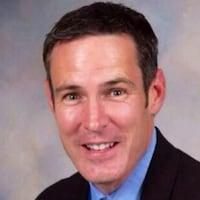AMERICUS — In a pecan grove that rises along Ga. 49 at the edge of a red-dirt road in Sumter County, Nestor Bunda began hugging the trees nearly a year ago. He was praying back then that they’d bear nuts this fall.
Aside from having a love for butter-pecan ice cream, the chaplain and religious historian from the Philippines knew little of America’s native nut tree. Or of this particular variety’s tendency to produce its most robust crop every other year.
But many of the other two dozen or so residents at the communal, ecumenical Koinonia Farm knew: 2024 was supposed to be an off year.
So, as he ambled through the grove one day after morning worship at their grove-side chapel, they watched with amusement.
“Why are you laughing?” he’d ask them.
Because, they’d tell him, the nuts come every other year and there’d been a fine crop last fall.
“I will still pray,” Bunda, a 67-year-old former pastoral manager at Baylor University Medical Center in Dallas, Texas, responded. “Why not?”
Let this stand as a testament to all Doubting Thomases: This fall at Koinonia, to everyone’s pleasant surprise, a sizable enough crop of pecans burst forth. And the orchard, in late September, avoided the wrath of tree-toppling Hurricane Helene, which had been on a path to thrash southwest Georgia before spinning off on a northeasterly track.
Credit: Joe Kovac Jr.
Credit: Joe Kovac Jr.
Maybe it shouldn’t have been so unexpected. Koinonia Farm has been defying the odds for more than eight decades.
Established in 1942 by Clarence Jordan, an idealistic minister and Greek scholar, Koinonia Farm was envisioned as a place where residents could live out their faith by welcoming people of all races, sharing possessions and staying committed to nonviolence.
Its formation in rural Georgia, during a time when the South was just as firmly committed to segregation, drew the ire of the Ku Klux Klan. White supremacists tried to intimidate farm residents into leaving. Koinonia’s roadside stand was bombed and the farm’s products were boycotted.
Yet Koinonia remains, despite financial mismanagement in the 1990s that forced the sale of more than half its land to retire a debt.
Credit: Joe Kovac Jr.
Credit: Joe Kovac Jr.
Pecans have long been vital to the farm’s mission and its survival via a mail-order nut-and-candy operation that ships Southern delights, from hickory-roasted pecans to blueberry spreads, worldwide.
The farm’s origin story, printed on many of its products’ packages today, mentions how, in the face of violence in the middle 1900s, the farm began using a slogan, a double entendre poke of a marketing campaign as it were, to “help us ship the nuts out of Georgia!”
As this year’s holiday-sales season cranks up, the bounty of the pecan crop Bunda prayed for is shipped bearing that same message.
“I believe it was his prayers,” says Sue Morrison, the farm’s hospitality coordinator, who gives tours of the 575-acre spread, which fans out above the Muckaloochee Creek about 7 miles southeast of Jimmy Carter’s house in Plains. “Lo and behold, the trees produced a crop. So that’s the prayed-for crop.”
Credit: Joe Kovac Jr.
Credit: Joe Kovac Jr.
Bunda came to spend a year as a farm volunteer.
He had dreamed of visiting Koinonia — a Greek word for communion or fellowship, say it “coy-na-nee-uh” — since 1974.
It was then, in the Philippines, that he met an early resident of the farm and a fixture of its most trying times. Conrad Browne, a Baptist minister who’d spent the turbulent 1950s and early 1960s at the farm, befriended Bunda.
When Bunda went to seminary, Browne encouraged and supported Bunda. Years later, long after Bunda moved to the U.S. and found work as a chaplain, Browne still sent him occasional $20 checks. Bunda would laugh and tell Browne, “It’s OK. I have a job now.”
These days, Bunda figures that same spirit of togetherness and sharing lives on at Koinonia, which spawned Habitat for Humanity and has inspired other charitable deeds.
“It’s really an antidote toward extreme individualism and extreme militarism and extreme racism,” he says of the farm.
Bunda says the goods they sell are in large part purchased by those who “love what we are doing. … We know that our products here are patronized by people around the globe. And that’s part of our mission to serve others.”
Credit: Joe Kovac Jr.
Credit: Joe Kovac Jr.
About the Author
Keep Reading
The Latest
Featured







